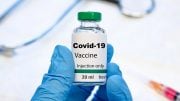
The emergence of COVID-19 variants such as delta and omicron have sent scientists scrambling to determine whether existing vaccinations and boosters are still effective against new strains of SARS-Cov-2.
A new response to the rapidly mutating virus might be found right at the door to our lungs, says Yale’s Akiko Iwasaki, the Waldemar Von Zedtwitz Professor of Immunobiology. In a new study, she and her colleagues found that intranasal vaccination provides broad-based protection against heterologous respiratory viruses in mice, while so-called systemic immunization, which uses an injection to elicit body-wide protection, did not.
Their findings are published today (December 10, 2021) in the journal Science Immunology.
“The best immune defense happens at the gate, guarding against viruses trying to enter,” said Iwasaki, senior author of the study.
Mucous membranes contain their own immune defense system that combat air- or foodborne pathogens. When challenged, these barrier tissues produce B cells which in turn secrete immunoglobin A (IgA) antibodies. Unlike vaccines which elicit a system-wide immune response, IgA antibodies work locally on mucosal surfaces found in the nose, stomach, and lungs.
While the protective role of IgA-producing cells had been well established in combatting intestinal pathogens, Iwasaki’s lab wondered if triggering IgA response might also produce a localized immune response against respiratory viruses.
Working with researchers at Icahn School of Medicine at Mount Sinai in New York, they tested a protein-based vaccine designed to jump start an IgA immune response, administering it to mice through injections, as is commonly done with systemic immunizations, and also intranasally. They then exposed mice to multiple strains of influenza viruses. They found that mice that had received vaccine intranasally were much better protected against the respiratory influenza than those that received injections. Nasal vaccines, but not the shot, also induced antibodies that protected the animals against a variety of flu strains, not just against the strain the vaccine was meant to protect against.
The Yale team is currently testing nasal vaccine strains against COVID strains in animal models.
While both vaccine injections and nasal vaccines increased levels of antibodies in the blood of mice, only the nasal vaccine enabled IgA secretion into the lungs, where respiratory viruses need to lodge to infect the host, Iwasaki said.
If the nasal vaccines prove to be safe and efficient in humans, Iwasaki envisions them being used in conjunction with current vaccines and boosters that work system wide in order to add immune system reinforcements at the source of infection.
Reference: “Intranasal priming induces local lung-resident B cell populations that secrete protective mucosal antiviral IgA” by Ji Eun Oh, Eric Song, Miyu Moriyama, Patrick Wong, Sophia Zhang, Ruoyi Jiang, Shirin Strohmeier, Steven H. Kleinstein, Florian Krammer and Akiko Iwasaki, 10 December 2021, l Science Immunology.
DOI: 10.1126/sciimmunol.abj5129
Other co-first-authors of the study are Ji Eun Oh, Eric Song, and Miyu Moriyama, all from Yale.









Be the first to comment on "Nasal Vaccine May Be the Secret Weapon Against New COVID-19 Variants"